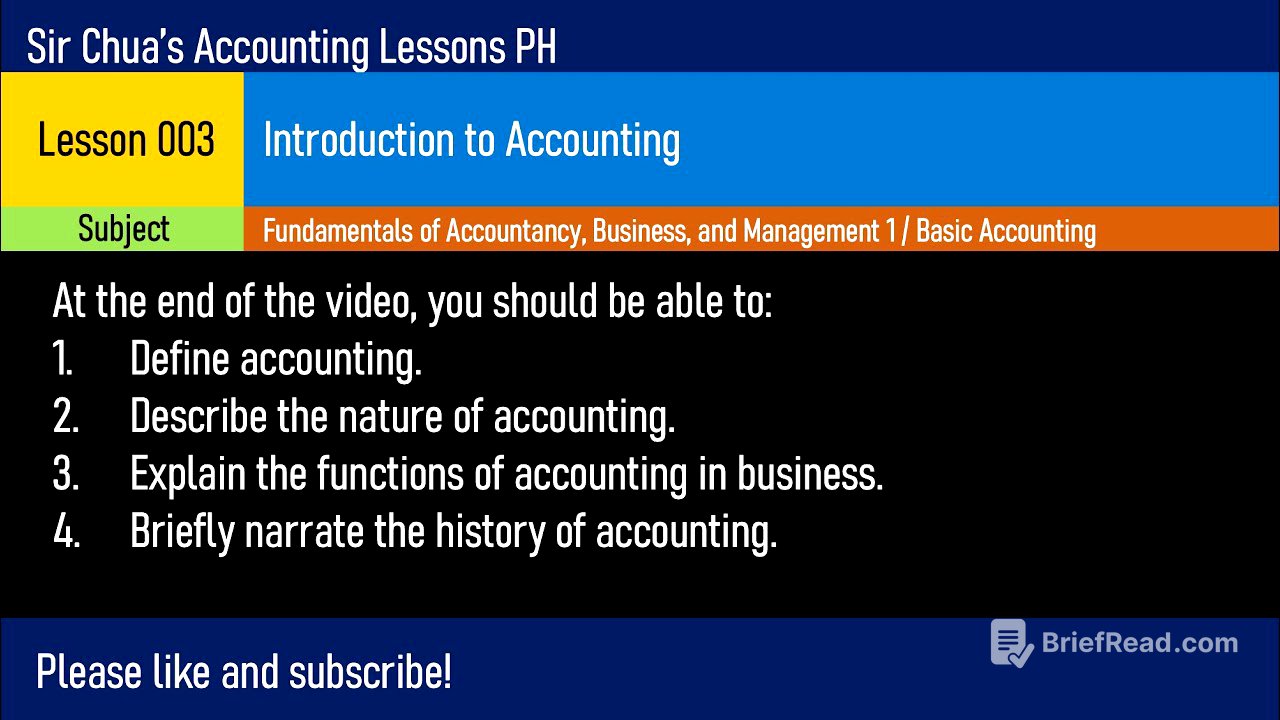TLDR;
This video introduces accounting, defining it as a service activity that provides quantitative, financial information to help economic entities make informed decisions. It covers the nature and functions of accounting, including record-keeping, communication of financial results, and meeting legal requirements. Additionally, it touches on the history of accounting, highlighting its origins in ancient civilizations and the contributions of Luca Pacioli, the father of accounting, including double-entry bookkeeping.
- Accounting is a service activity providing financial information for economic decisions.
- Key functions include systematic record maintenance and communicating financial results.
- Accounting's history dates back to ancient civilizations, with Luca Pacioli pioneering double-entry bookkeeping.
Introduction to Accounting [0:13]
The lesson introduces accounting as a service activity that provides quantitative, primarily financial, information to economic entities. This information is intended to be useful for making economic decisions and choosing among alternative courses of action. The definition emphasizes accounting's role in providing a service through financial data.
Nature and Function of Accounting [2:31]
Accounting's function is to provide quantitative information, which is primarily financial in nature. This involves using numbers to represent financial data, such as revenues and expenses, to determine a company's net income or loss. For example, revenues are what a company earns, while expenses are the costs incurred to operate the business, like rent, salaries, and utility bills. The goal is to match revenues against expenses to understand the financial health of the business.
Accounting for Economic Entities [6:22]
Accounting is not limited to businesses but also extends to non-profit entities like churches and foundations, aiding in record-keeping. The information that accounting provides enables owners and managers to make economic decisions and choose from alternative courses of action. This helps them address issues and adjust strategies based on financial insights.
Definition and Nature of Accounting [8:28]
Accounting is defined as a service activity providing quantitative, financial information to help economic entities make decisions. Its nature includes being an art, financial in focus, and a systematic process. The functions of accounting involve maintaining records, communicating financial results, meeting legal requirements, protecting assets, and assisting management by providing operational information.
Accounting as the Language of Business [11:24]
Accounting serves as the language of business because it communicates financial information to owners and managers, helping them understand the entity's operations. It also aids in meeting legal requirements, such as those from taxation authorities and the Securities of Exchange Commission, and in protecting the assets of the business through proper record-keeping.
History of Accounting [12:30]
Accounting can be traced back to ancient civilizations, with evidence found in Egyptian tablets and Mesopotamian records dating back over 7,000 years. Early accounting records were also discovered in the ruins of ancient Babylon, Assyria, and Samaria. These civilizations used record-keeping to track trade and commerce.
Luca Pacioli: The Father of Accounting [14:50]
Luca Bartolomeo de Pacioli, known as the father of accounting, published a book in 1494 that included a chapter on business, detailing calculation and recording methods used by Italian merchants. Pacioli is credited with popularizing the double-entry bookkeeping system, where every business transaction affects at least two accounts, ensuring that the accounting equation remains balanced. His work also covered methods like the preparation of trial balances.









